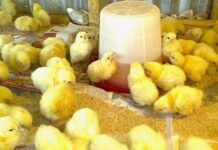Deadline: 1-Aug-23
The Institute of Food Technologists (IFT) and the Seeding the Future Foundation are calling on all scientists, engineers, innovators, entrepreneurs, and multidisciplinary teams from non – governmental organizations (NGOs), non – profits, social enterprises, universities, research institutions as well as small and emerging for-profit enterprises to submit game changing innovations that will help transform the food system
Hosted by the Institute of Food Technologists and funded by the Seeding The Future Foundation, the Challenge is intended to support innovations that have the potential for significant impact at scale and over time, and benefit at least one or more of the following intersecting domains: nutritious food for a healthy diet; sustainably produced; and accessible, appealing, affordable, and trusted by consumers.
The goal of the Seeding The Future Global Food System Challenge is to inspire and support innovative, diverse, and multidisciplinary teams to create game-changing innovations that will help transform the food system.
Mission: Seeding The Future’s mission is to seed and support impactful initiatives and organizations that create and accelerate the pace of innovations that help transform food systems to become more nutritious, regenerative, and equitable for everyone in alignment with the overall vision.
Vision: Seeding The Future’s vision is a global food system that always provides equitable access to safe, nutritious, trusted, affordable and appealing food for everyone and improves the health of people and the planet by being sustainable, resilient, and regenerative. The moonshot goal is to positively impact the lives of one billion people.
Innovation Focus Areas
- Empower Conscious Consumer Choices
- Safe Nutritious Food for a Healthy Diet
- Sustainable Regenerative Practices.
Award Levels
- The Seeding The Future Global Food System Challenge will provide monetary awards in the form of grants and prizes totaling up to one million US dollars annually. They invite applicants from national or international universities, research institutions, or nonprofit organizations, as well as small or early-stage North American or European for-profit businesses.
- The Challenge will provide three levels of awards to incentivize transformative food system innovations at different stages of their development. Applications can only be submitted at one award level.
- Seed Grants ($25,000 each) will be awarded to organizations that are planting and nurturing high-potential, innovative ideas and have developed a prototype and/or initial proof of concept demonstrating feasibility. Innovation must benefit at least one, ideally two domains of the Innovation Focus Area without negatively impacting the others.
- Growth Grants ($100,000 each) will be awarded to organizations that have demonstrated that their innovation is doable and have projected both economic feasibility at scale and high-impact potential to transform the food system. The innovation must benefit at least two, ideally three domains with no negative impact on the others.
- Seeding The Future Grand Prizes ($250,000 each) will be awarded to organizations that have created innovations that are scalable, economically feasible at scale, trusted, and compelling to consumers, and have demonstrated major impact potential to transform the food system. The innovation must benefit at least two, ideally three domains with no negative impact on the others.
Eligibility Criteria
- To be eligible for an award, the project must be innovative, impactful and lead to new advances that benefit at least one but ideally more than one of the intersecting domains of the Innovation Focus Area, shown in the diagram, while not negatively affecting any of the other domains. Innovations that benefit two or more domains and are at an advanced development stage are eligible for the highest award levels. The definition of Innovation in the context of this challenge is: A novel idea, approach, concept or technology that is practicable and leads to a significant beneficial for people or the environment.
- The following organizations are eligible to compete in the Challenge:
- Non-profits located in any country
- Academic or research institutions located in any country
- Early-stage or emerging North American or European based for-profit companies (‘small companies’)
- Individuals are not eligible to apply. Please note, however, that teams of students or researchers may participate as part of their University or Research Institution’s submission. Organizations are encouraged to form teams to compete in the Challenge. If two or more organizations form a team to compete, they should choose one of the organizations to serve as the applicant.
Documents to Verify Your Organizational Status and Financial Standing
- North American or European based for-profit organizations must submit:
- Most recent financial statement that includes a budget and revenue (including disclosure of current levels of investment and financial assets)
- Articles of Incorporation or similar documents
- Federal Tax ID Number (TIN) or tax status documentation
- Certificate of good standing, indicating that the business is properly registered with the state or country
- U.S. based non-profit organizations must submit:
- Most recent financial statement (audited financials preferred but not required)
- Most recent 990 -OR-
- IRS letter of determination
- Non-profit organizations based outside of the United States must submit:
- Most recent financial statement (audited financials preferred but not required)
- Documentation verifying that the applicant organization is currently registered as a non-profit organization (equivalent to a US 501(c)(3) public charity) in its country. Please note that IFT may follow up to request additional documentation to verify the applicant’s non-profit status.
What the Challenge Won’t Fund
- Projects that have a negative effect on either the safety or healthfulness of food, the sustainability of the food supply chain or, that are unlikely to be accepted by the end-user or consumer
- Theoretical concepts or ideas without any experiments or a reduction to practice
- Individual persons
- Projects where funds will be used to support large for-profit entities in their commercial activities such as R&D, Innovation, Manufacturing or Sales/Marketing
- Initiatives which are not scalable beyond the initial project scope and have limited projected impact over time
- Projects associated with political campaigns or lobbying
- Capital campaigns
- For profit entities with significant financial assets or which passed Series A financing round.








